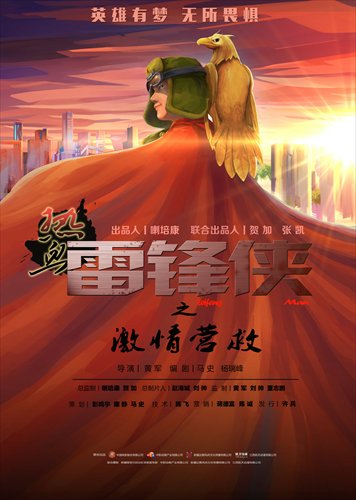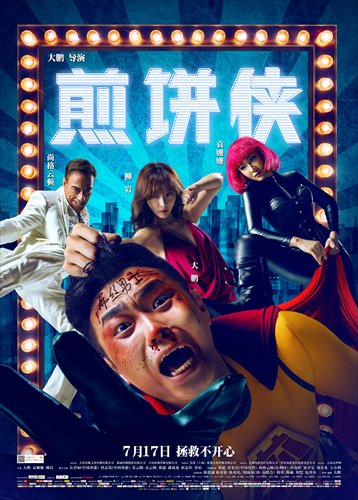Superheroes get the ‘made in China’ treatment

Promotional material for Leifeng Man and Jianbing Man (inset) Photos: Courtesy of Tuo Ying and IC

Promotional material for Leifeng Man and Jianbing Man (inset) Photos: Courtesy of Tuo Ying and IC
Iron Man, Spider-Man, Ant-Man and Superman are all representative US superheroes that are widely popular, even in China. With these Hollywood blockbusters about superheroes making money hand over fist, Chinese filmmakers have been inspired to come up with some superheroes of their own.
This has met with some success. Just last year, superhero comedy Jianbing Man set records in China, earning 1.1 billion yuan ($167 million) in the mainland market.
Yet, not every hero with a "man" in their name is able to be accepted by audiences in China, even if he is a homegrown hero. The hero of the upcoming Chinese animated film Leifeng Man is one example.
Too heroic?
The plot synopsis released by the film's producers is very straightforward: "College student Zheng Yi is a warm-hearted young man who likes to help people in need. To buy a racing bicycle, Zheng has several part-time jobs. One day, one of his co-workers is forced to drink digouyou (gutter oil), black market cooking oil made from waste oil collected from a number of illicit sources such as grease traps and sewer drain runoff, this alters his genes and turns him into Digouyou Man. Disguising himself with a hat that looks just like the one worn by the famous CPC soldier/icon Lei Feng, Zheng gets involved in a series of fights with Digouyou Man, earning him the nickname Leifeng Man. Meanwhile, Shen, the owner of a toy shop, invents a robot that can control the minds of children. After Leifeng Man interferes with his plan, the shop owner kidnaps Zheng's friends and holds them hostage. Now Leifeng Man must join forces with Digouyou Man to defeat Shen and his robot."
Scheduled to hit cinemas in August, the film held its red carpet premiere in Beijing on Sunday.
In a rare occurrence, the premiere was attended by Zhang Hongsen, the director of the Film Bureau of the State Administration of Press, Publication, Radio, Film and Television. Zhang praised the film for building a heroic image close to reality and for being a combination of Lei Feng's spirit with current society.
However what Zhang liked about the film, one of the producers of which it should be noted is the State-run China Film Group, could be its downfall.
Looking at the trailer and other promotional materials about the film, many Chinese audiences have expressed concern that the film will have too mainstream of a political ideology, while also criticizing the film as just copying the West.
"It seems like another copycat product, like what domestic animated film The Autobots is to Hollywood animated film Cars," Yu Xiaoxin, a college student in Shanghai, told the Global Times.
"And the way the story is told, as seen from the released plot synopsis, it seems so much like political propaganda that it's making people sick."
From live action to cartoon
This is not Leifeng Man's first appearance. In 2011, Ma Shi, the film's scriptwriter, directed a half-an-hour long live action film of the same name and a 50-minute long sequel in 2013. While not very well-known, the two short films did earn some fans who found them funny and entertaining.
Still a college student in 2011, Ma told the Global Times that he is a person with a hero complex who wants to create a superhero for China. According to Ma, he chose to model the character on Lei Feng because of the soldier was an easily identifiable icon.
"I think such a superhero is very grounded," Ma said.
Ma said that they chose to adapt his earlier two films in animated form because the medium had more advantages over live action films.
"Animation can tell a story with more freedom without a lot of monetary investment," he said.
As for voices critical of the new film, Ma feels their reaction is not unexpected.
"European and US cultures have had a tremendous influence on this young generation. It's deeply rooted from childhood. People will accept without any problem seeing Captain America, but there is a big gap when it comes to our own cultural recognition," Ma said.
Zhou Xing, dean of the School of Art and Communication at Beijing Normal University, however, is also negative about the recent Chinese superhero film trend.
He criticized studios as lacking creativity and preferring to take shortcuts by copying what has worked in the West.
Newspaper headline: Homegrown hero